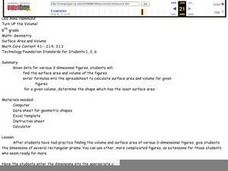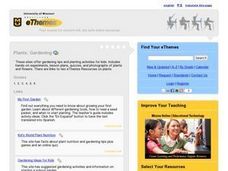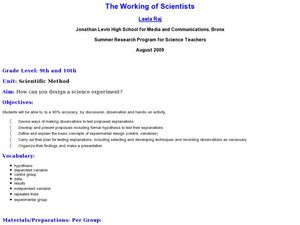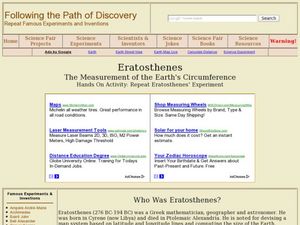Curated OER
Digestion Simulation
Learners study the human digestion system and the functions of the stomach and small intestines. In this digestion lesson students view a demonstration on the process.
Teach Engineering
Biological Processes: Putting Microbes to Work
Is there such a thing as useful microbes? Get ready to perform experiments on applying microbes for wastewater treatment. The first installment of the three-part unit provides background information to prepare young engineers for two...
Curated OER
Color Mixing
Students experiment with primary colored water to mix new colors. They record new colors on a simple data sheet and share opinions on their work.
Curated OER
An Intuitive Introduction to Density
Students complete experiments discovering the relationship between density and mass. They use the internet to gather information before the experiment. They discuss the activity once it is completed.
Curated OER
Soil Nutrients - Phosphorus Lab Lesson Plan
Students list sources of phosphorus in soil. They explain how phosphorus is removed from the soil and used by plants. Students list the symptoms of insufficient or excess phosphorus. Students perform experiments to examine the effect of...
Curated OER
Alcoholic Fermentation in Yeast
Biology learners investigate the effect of sucrose concentration on yeast alcoholic fermentation. During the lesson,they compare and contrast the processes of cellular respiration and alcoholic fermentation. They design an experiment to...
Curated OER
Highs And Lows
Learners experiment to examine high and low pressure areas. They investigate why a high pressure area seeks a low pressure area.
Curated OER
Where's the Beef - Beef Facts or Hype, Is it Bad for You?
Analyze a Happy Meal™ for nutrient content and calories. Blend the contents into "McMush" and use Biuret's solution to test for protein content. There are a few problems with the lesson plan: the resource links are no longer...
Curated OER
Turn Up the Volume
Measuring volume can be a mystery for 5th graders, but this hands-on activity gives the gift of discovery. The volume of simple rectangular solids and irregular shapes are calculated through various methods including displacing liquid in...
Curated OER
How Things Fly
Middle schoolers conduct a series of hands-on experiments that help them explain the role of lift in fixed-wing flight. They observe the flow of air and water around several surfaces and then consider the dynamics of airflow around an...
Curated OER
Plants: Gardening
Pupils access a variety of gardening-themed websites that present gardening tips and planting activities for kids. They view photographs of plants, take quizzes and conduct hands-on experiments.
Curated OER
Science Unit Lesson Five
Sixth graders review how and which plants operate in terrariums. In groups, they follow instructions to make their own terrarium and place different types of plants in it. To end the lesson, they review the steps in the water cycle and...
American Chemical Society
Why Does Water Dissolve Salt?
Individuals explore solubility by modeling how water dissolves salts. They then view a video and compare how well water and alcohol dissolve salts, relating their comparisons to the structure of each molecule.
American Chemical Society
Using Chemical Change to Identify an Unknown
If you discover an unknown powder, how do you determine if it is safe? Lesson uses four different tests to identify the properties of various powders that appear the same. Then scholars get an unknown powder and have to determine which...
Curated OER
Determining the Geologic History of Rocks from a Gravel Deposit
Students apply the scientific method to identify rocks from glacial deposits, hypothesize how they got there and then test their hypothesis. They are given the experience of active, hands-on inquiry.
Curated OER
Placebo - 1
Students explore the placebo effect, thus producing the positive effects of acupuncture without needle insertion. Students discuss echolocation. They participate in hands-on/minds-on activities in reflected sound waves. They...
Curated OER
The Working of Scientists
Young scholars define and explain the basic concepts of experimental design. In this scientific method lesson students complete a hands on activity, develop and present proposals to test their explanations.
Curated OER
Out and About: Sound
Students visit science museums. In this hands-on science lesson, students visit the Magna Science Adventure Center, Thinktank, and the Museum of Science and Industry.
Curated OER
Reading the Waves
Students view video segments which reveal the parts of sound and what factors control sound. The viewing and post-viewing activities serve to reinforce the video segments using worksheets and hands-out experiments.
Curated OER
Heat: Mini Unit
Students experiment with heat. In this physical science lesson, students engage in hands-on activities to develop concepts related to heat. Students offer explanations for their observations using given vocabulary.
Curated OER
It All Began With a Bean
Students explore human anatomy by participating in hands-on activities. In this digestive system lesson, students read the book It All Began With a Bean and discuss the process of food digestion in our body. Students utilize soda...
Curated OER
Eratosthenes
Students examine what Eratosthenes is and the history behind him. In this earth lesson students complete a hands on activity to repeat Eratosthenes' experiment.
Curated OER
Survival Under a Rock
Pupils investigate ways that animals adapt to their environments through hands-on activities using isopods and an interactive video.
Curated OER
Earth's Radiation Budget
Twelfth graders explore the Earth's radiation budget using Earth radiation Budget Experiment (ERBE) data archived at the IRI/LDEO Climate Data Library. They use photometers and light sources to work through several hands-on activities...























